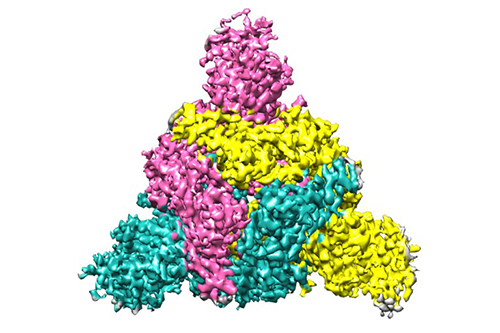In response to the urgent need for COVID-19 therapeutics, vaccines and diagnostics, many expert UK scientists are working to understand the fundamental biology of SARS-CoV-2. Reliable protein reagents are crucial to such research, but can be challenging and time consuming to produce, especially under restricted working conditions.
To facilitate vital research on SARS-CoV-2, Wellcome and UKRI have brought together a consortium of leading centres of protein engineering and production to launch the COVID-19 Protein Portal. The COVID-19 Protein Production Consortium (CPPC) is made up of expert scientists from Diamond Light Source, the Edinburgh Protein Production Facility, the Francis Crick Institute, the MRC Laboratory of Molecular Biology, the MRC Protein Phosphorylation and Ubiquitylation Unit at the University of Dundee, MRC-University of Glasgow Centre for Virus Research, The Rosalind Franklin Institute, STRUBI, the Structural Genomics Consortium, and the University of Bristol; with logistical support from INSTRUCT-ERIC.
The CPPC will produce and provide access to protein reagents through the COVID-19 Protein Portal website. The Portal contains a searchable database of reagents, including viral proteins, human proteins and antibodies relevant for SARS-CoV-2 biology. Each reagent is annotated with key information, including sequence, origin, and SDS-page results. Researchers select the proteins they require from the database and submit their request with a short research proposal. All requests will be subject to rapid peer review, to enable the CPPC to coordinate and prioritise reagent allocation based on scientific merit and the urgency of the request. Once approved, a request will be allocated to one of the CPPC’s expert protein production laboratories, all of whom are committed to providing high-quality reagents as quickly as possible.
In the spirit of Open Science, recipient labs will be required to provide feedback to the CPPC on their results, and to share important outcomes with the scientific community. By contributing to the coordination of research efforts across the UK, the COVID-19 Protein Portal will accelerate vital research to deliver effective clinical management of COVID-19.
Dr Michael Dunn, Wellcome’s Head of Genetics and Molecular Science, said: “Researchers around the world are working at an unprecedented pace to deepen our understanding of COVID-19 and develop vaccines, treatments and tests against it. By collaborating across borders and openly sharing research and resources, we can learn more about the virus and help to bring this pandemic to an end.”
Professor Fiona Watt, Executive Chair of the Medical Research Council added: “The COVID-19 Protein Portal brings together the expertise of leaders in protein engineering and production throughout the UK, including colleagues in MRC funded Institutes and Units. These researchers have very quickly developed high-quality robust research reagents, now being shared through the Portal. This consortium is an ideal demonstration of collaboration and coordination across the research community, aiming to accelerate progress towards treatment of COVID-19.”
At Bristol, customised reagents will be produced using the MultiBac baculovirus expression platform in Professor Imre Berger’s laboratory. This award-winning technology was originally conceived to produce large human multiprotein complexes in high quality and quantity to unlock their structure and mechanisms. Now it is used by a core team of experts, who volunteered to supply their colleagues in Bristol and beyond with protein components of the SARS-CoV-2 virus.
Professor Imre Berger, Director of the Max Planck-Bristol Centre for Minimal Biology at the University of Bristol, said: “I am immensely proud that Bristol is able to contribute to such a vital resource to the UK scientific effort against COVID-19. Reagents are critical to COVID-19 testing and vaccine research, but they are expensive and often difficult to source given the current demand for them.
“At Bristol we have the expertise and technology to make customised high-quality reagents for use in serology and vaccine testing. Pooling resources and knowledge such as these are key to helping the wider scientific community understand and find ways of fighting the virus.”
The CPPC project is one of many projects that Bristol is currently undertaking in response to the COVID-19 crisis. Bristol researchers formed the Bristol COVID Emergency Research Group (UNCOVER) to pool resources, capacities and research efforts to tackle the current pandemic.
Bristol UNCOVER includes clinicians, immunologists, virologists, synthetic biologists, aerosol scientists, epidemiologists and mathematical modellers and has links to behavioural and social scientists, ethicists and lawyers.
For more information about the University of Bristol’s coronavirus (COVID-19) research priorities visit: www.bristol.ac.uk/research/impact/coronavirus/research-priorities/ @BristolUncover
